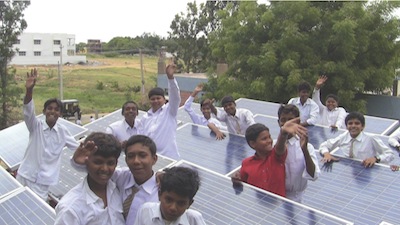 An environmental studies graduate student has designed a project that builds on his engineering skills, his Indian heritage and his passion for social and environmental change.
An environmental studies graduate student has designed a project that builds on his engineering skills, his Indian heritage and his passion for social and environmental change.
As a first-generation American, Raj Vable has always been interested in his Indian heritage. But while he appreciated his parents’ tales of their home country, India felt far removed from his own experiences growing up in the U.S.
Three years ago, as a senior at the University of Michigan, Vable began to ponder more seriously his plans after school. He was majoring in electrical engineering but dreamt of a career that would be more than a nine-to-five job, and wanted to explore his family heritage. Opportunities that met both criteria seemed slim.
Now, as a second-year graduate student at the UO, Vable has forged a unique and meaningful path for himself. As part of his program in environmental studies, he has designed a project that builds on his engineering skills, his Indian heritage and his passion for social and environmental change.

With the support of family, friends, donors and the entire community of Pavagada, India, Vable has successfully led an effort to bring reliable energy and updated computers to a rural school in his mother’s hometown.
Right: Students from the Jnana Bodhini School celebrate the installation of solar panels that help maintain reliable power for their computer lab.
Like many areas of India, Pavagada relies on electricity from an unstable power grid. Blackouts are common and impossible to anticipate; the local Jnana Bodhini School—serving just over 1,000 students ranging in age from five to sixteen—routinely loses power from the grid four or more hours every school day.
Vable’s project has involved installing solar panels on the roof of the school to provide renewable and reliable power, and then connecting this new energy source to the computer lab.
Prior to Vable’s efforts, the school’s valuable computer lab, the only resource of its kind in the school district, sat mostly empty as the irregular outages made it futile to schedule classes.
Vable hatched the solar power idea after hearing about the situation from his sister, who had gone abroad to Pavagada to teach chemistry. Already a solar enthusiast, Vable recalls the moment when “something clicked—I realized, here was an opportunity to put solar into practice, and also work with the village where my mother had grown up.”
Vable suggested the idea to an uncle who lived in Pavagada and was also associated with the school. With this family connection and the enthusiastic support of his friends, Vable put his project into action.
It took several trips to India, long delays between equipment shipments and lots of patience, but by June 2011, Vable, instructing a team of volunteers, had replaced the aging computers in the lab with twenty energy-efficient models and installed a sufficient number of donated solar panels to run the new lab.
While there is still work left to do— plans to establish Internet access and launch an after-hours Internet café are in the works—the Jnana Bodhini School now has regularly scheduled computer classes that rely on the solar panels for back-up power when the grid goes down.
It was in the midst of this project that Vable decided to pursue a graduate degree in environmental studies at the UO.
“I realized that the technical understanding from my engineering degree was necessary for engaging in this type of development work—but far from sufficient,” he said. “There were too many economic, political and social issues at play that I wanted to understand more deeply.” This is the exact strength of the environmental studies program.
In addition to continuing to work with the Jnana Bodhini School, Vable is now working on another renewable energy project with an organization in the Himalayas called Avani, developing energy technologies derived from pine needles (i.e., biomass conversion) for rural mountainous communities.
“The Jnana Bodhini School project has been a chance for me to connect with my Indian identity and to make a difference in the world,” Vable said. “I’ve been bowled over by the support that Americans have given, both financially and morally, and I’ve been amazed at how open to outsider input the people in Pavagada have been, how willing they were to treat me, a twenty-two-year-old kid, as an equal.”
—Patricia Hickson
 An environmental studies graduate student has designed a project that builds on his engineering skills, his Indian heritage and his passion for social and environmental change.
An environmental studies graduate student has designed a project that builds on his engineering skills, his Indian heritage and his passion for social and environmental change. With the support of family, friends, donors and the entire community of Pavagada, India, Vable has successfully led an effort to bring reliable energy and updated computers to a rural school in his mother’s hometown.
With the support of family, friends, donors and the entire community of Pavagada, India, Vable has successfully led an effort to bring reliable energy and updated computers to a rural school in his mother’s hometown.





 study by UO economists, released just before the Rose Bowl, has been picked up by the media far and wide.
study by UO economists, released just before the Rose Bowl, has been picked up by the media far and wide.